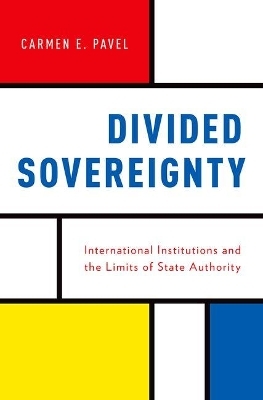
Divided Sovereignty
Oxford University Press Inc (Verlag)
978-0-19-069217-9 (ISBN)
The question of how to constrain states that commit severe abuses against their own citizens is as persistent as it is vexing. States are imperfect political forms that in theory possess both a monopoly on coercive power and final jurisdictional authority over their territory. These twin elements of sovereignty and authority can be used by state leaders and political representatives in ways that stray significantly from the interests of citizens. In the most extreme cases, when citizens become inconvenient obstacles in the pursuit of the self-serving ambitions of their leaders, state power turns against them. Genocide, torture, displacement, and rape are often the means of choice by which the inconvenient are made to suffer or vanish. In Divided Sovereignty, Carmen Pavel explores new institutional solutions to this abiding problem. She argues that coercive international institutions can stop these abuses and act as an insurance scheme against the possibility of states failing to fulfill their most basic sovereign responsibilities. She thus challenges the longstanding assumption that collective grants of authority from the citizens of a state should be made exclusively for institutions within the borders of that state. Despite worries that international institutions such as the International Criminal Court could undermine domestic democratic control, citizens can divide sovereign authority between state and international institutions consistent with their right of democratic self-governance. Pavel defends universal, principled limits on state authority based on jus cogens norms, a special category of norms in international law that prohibit violations of basic human rights.
Thoughtfully conceived and forcefully argued, Divided Sovereignty will challenge what we think we know about the relationship between international institutions and the pursuit of the fundamental requirements of justice.
Carmen E. Pavel is a political theorist who specializes in contemporary political philosophy and the history of political thought. Her interests include liberal theory and contemporary challenges to it, ethics and public policy, international justice, the authority of international institutions, and environmental ethics. She is Lecturer in International Politics and Director of the BA in Philosophy, Politics, and Economics (PPE) Programme King's College London.
Introduction
1. Why Divided Sovereignty?
2. Method and Justification
3. Outline of the Book
Chapter 1 Sovereignty, the Social Contract, and the Incompleteness of the State System
1. The Institutions of the Social Contract
2. On Sovereignty and Delegation of Authority
3. Problems of Institutional Design
4. Conceptual and practical Hurdles to Divided Sovereignty
5. Conclusion
Chapter 2 Divided Sovereignty: the Principal-Agent Model
1. Sovereignty Limiting Norms and their Current Effects
2. Divided Sovereignty: The Principal-Agent Model
2.1 The Origins of the Model
2.2 The Principle-Agent Model for International Institutions
2.3 Delegation
2.4 The Role of Consent
3. Agency Costs at the International Level
4. Why Use Principal-Agent Theory?
5. Conclusion
Chapter 3 Domestic and International Implications: Slavery, Genocide and Civil War
1. The Scope and Limits of International Authority
2. Constitutional Interpretation and Change
3. Slavery
4. Genocide
5. Civil Wars and Failed States
6. Conclusion
Chapter 4 Theories and Institutional Facts
1. One Step Theorizing: Cosmopolitan Justice
2. Two Step Theorizing: The Case of Humanitarian Intervention
3. Objections
4. Conclusion
Chapter 5 Romanticizing Institutions
1. Cosmopolitan Global Democracy
2. Rule of Law Experiments
3. Rule of Law for Global Democracy
4. Institutional Assumptions and Bureaucratic Pathologies
5. Conclusion
Chapter 6 Institutional Pluralism
1. Institutions in International Criminal Law
2. Fragmentation and Conflict
3. The Benefits of a Pluralist System
4. Complex Social Orders
5. A Hobbesian Challenge
6. Conclusion
Chapter 7 The Possibility of Rule-Governed Behavior in International Politics
1. Cooperation under Anarchy
2. Assumptions and Implications of International Relations Theorizing
3. Self-Preservation as the Dominant State Preference
4. The Possibility of a Rule-Governed Order
Conclusion
| Erscheinungsdatum | 11.07.2017 |
|---|---|
| Verlagsort | New York |
| Sprache | englisch |
| Maße | 168 x 235 mm |
| Gewicht | 350 g |
| Themenwelt | Naturwissenschaften ► Geowissenschaften ► Geografie / Kartografie |
| Sozialwissenschaften ► Politik / Verwaltung ► Europäische / Internationale Politik | |
| Sozialwissenschaften ► Politik / Verwaltung ► Politische Systeme | |
| Sozialwissenschaften ► Politik / Verwaltung ► Politische Theorie | |
| ISBN-10 | 0-19-069217-0 / 0190692170 |
| ISBN-13 | 978-0-19-069217-9 / 9780190692179 |
| Zustand | Neuware |
| Haben Sie eine Frage zum Produkt? |
aus dem Bereich


